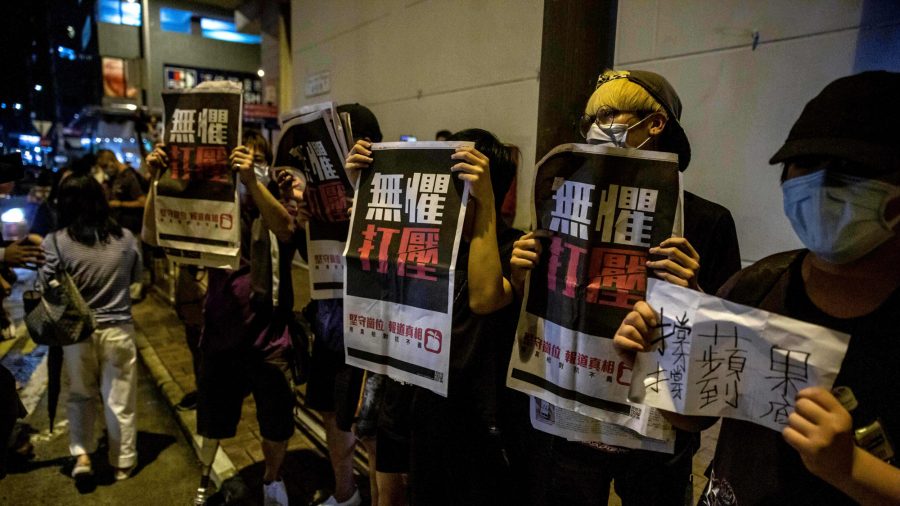The communist regime’s tightening grip on Hong Kong entered into a new phase after police arrested media mogul Jimmy Lai and raided the newsroom of his media outlet, stoking fears that Beijing is intent on extinguishing press freedoms.
Lai, a strident critic of the Chinese Communist Party (CCP), was arrested on Aug. 10, along with his two sons, on allegations of collusion with foreign forces under the city’s new national security law enacted by Beijing. Later that day, more than 200 police officers raided the newsroom of Lai’s newspaper Apple Daily, the city’s largest pro-democracy outlet, and collected 25 boxes of evidence.
On the same day, several other media and democracy figures were arrested, including prominent activist Agnes Chow. Police said 10 people—nine men and one woman—were arrested on Aug. 10, without providing more details.
The arrests and raid were met with sweeping condemnation from officials and activists around the world.
“This is the most outrageous assault yet on what is left of Hong Kong’s free press,” said Chris Patten, the last British governor of Hong Kong, in an Aug. 10 statement released by NGO Hong Kong Watch.
The U.S. and UK governments expressed deep concern over the move, with the UK saying the arrests were further evidence of the national security law being used as a “pretext to silence opposition.” Hong Kong was a former British colony until the territory was handed back to China in 1997, with the regime pledging that it would allow the city a high level of autonomy and freedoms not enjoyed in the mainland.
Freedoms Ending
The CCP has presided over an intensifying campaign against pro-democracy forces in Hong Kong since the national security law came into effect last month.
The law punishes any actions Beijing considers subversion, secession, terrorism, and collusion with foreign forces with up to life in prison. Prior to the law’s implementation, Beijing and the Hong Kong government said that it would only be used against a small minority of criminals, and would not impinge on the city’s freedoms.
Since July, popular protest slogans have been banned, pro-democracy candidates have been disqualified from the legislative council elections, and pro-democracy activists—including teenagers—have been arrested under the security law. Hong Kong leader Carrie Lam on July 31 announced that she would postpone the upcoming elections for one year, citing the CCP Virus outbreak. Activists, however, say the pro-Beijing government used the pandemic as an excuse to avoid a likely crushing defeat at the polls.
“It’s very obvious that the regime and the government are using the national security law to suppress political dissidents,” Chow told reporters after she was released on bail late Tuesday, adding that she was accused of colluding with foreign forces. Lai was later released on bail on early Wednesday.
The regime has also wielded the law to pursue Hong Kong activists living overseas. On July 31, Hong Kong authorities issued arrest warrants for six advocates currently based abroad, including a U.S. citizen, accusing them of secession or collusion with foreign forces.
Beijing said the security law has extraterritorial application, meaning it also applies to offenses committed outside the city by foreigners.
Hongkongers Defiant
Despite the growing suppression, Hongkongers have come out in support of the pro-democracy movement.
Tuesday’s edition of Apple Daily flew off the stands, with many locals lining up from early morning to buy the paper. Some supermarkets bought the newspaper and left it out for customers to take for free. Some protesters went to a mall in the town of Sha Tin and shouted slogans while holding the newspaper.
At a mall in the busy district of Mong Kok, a middle-aged woman was carrying a hand-drawn sign depicting Apple Daily’s logo. She said the newsroom raid was “completely illegal,” adding that she would continue to support the newspaper because “without freedom of speech, Hong Kong will fall.”
Meanwhile, shares in Next Digital, the media company that publishes Apple Daily, surged after Lai’s arrest and on the following day, gaining more than 2,078 percent from last Friday’s close, after online pro-democracy forums called on investors to show support.
Its market value rose as high as HK$5.17 billion ($666.7 million) on Tuesday from some HK$200 million last Friday.
In another show of support, long queues formed at lunchtime at the Cafe Seasons restaurant owned by Lai’s son Ian.
Last week, the United States imposed sanctions on Hong Kong leader Carrie Lam and 10 other Chinese and Hong Kong officials over their roles in subverting the city’s freedoms through implementing the new law. Beijing retaliated on Monday by sanctioning 11 U.S. citizens, including federal lawmakers and heads of U.S.-based nonprofits and rights groups.
Jenny Wang, a strategic advisor at New York-based nonprofit Human Rights Foundation, said the arrests and raid were likely retaliation for the recent U.S. sanctions, adding that more arrests of pro-democracy figures are foreseeable in the coming weeks.
“The Chinese government will continue to utilize various tools from their authoritarian toolbox to suppress the voices of Hongkongers and to encroach on their freedoms,” Wang told The Epoch Times.
Eva Fu and Reuters contributed to this report.
From The Epoch Times

